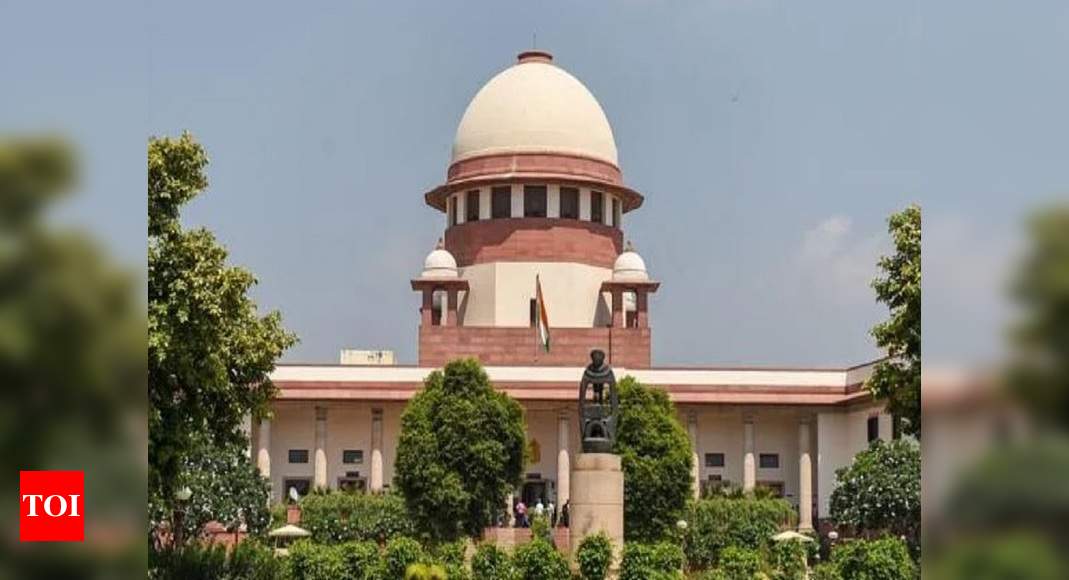NEW DELHI: Six months after a five-judge bench settled vexed issues relating to land acquisition, the Supreme Court on Monday sought to reopen the matter relating to time period for payment of compensation to land owners, saying the bench had not settled this.
A bench of Chief Justice S A Bobde and Justices A S Bopanna and V Ramasubramanian said the larger bench had held that land acquisition would lapse if the government had neither taken possession of the land nor paid compensation. But the three-judge bench had an issue with the ruling that if the government had taken possession of the acquired land, but not paid compensation, then the land acquisition would not lapse.
“For how long can the government not pay compensation after acquiring land without rendering the acquisition null and void?” asked the bench. Solicitor general Tushar Mehta, who had argued for the government before the five-judge bench, said the government would be liable to pay penal interest on the compensation amount if payments were delayed.
The bench said the law provided that land acquisition was to be completed within five years of initiating the process. “So if the government did not pay compensation for five years after acquiring the land, should the acquisition be termed null and void? These are larger questions which the five-judge bench has not addressed,” the bench said, indicating that it might explore the appropriateness of certain conditionalities.
The bench asked the SG to take instructions from the government. “We will also discuss among ourselves whether government could be permitted to defer making payments indefinitely,” the CJI said. The SC posted the matter for further hearing after two weeks.
On March 6, a bench of Justices Arun Mishra, Indira Banerjee, Vineet Saran, M R Shah and S Ravindra Bhat had cleared the air over validity of land acquisition that was initiated but could not complete it in the stipulated five-year period. The court ruled that the process would be deemed to have lapsed only if possession of land was not complete and no compensation had been paid.
The five-judge bench further clarified that delay caused due to intRead More – Source
NEW DELHI: Six months after a five-judge bench settled vexed issues relating to land acquisition, the Supreme Court on Monday sought to reopen the matter relating to time period for payment of compensation to land owners, saying the bench had not settled this.
A bench of Chief Justice S A Bobde and Justices A S Bopanna and V Ramasubramanian said the larger bench had held that land acquisition would lapse if the government had neither taken possession of the land nor paid compensation. But the three-judge bench had an issue with the ruling that if the government had taken possession of the acquired land, but not paid compensation, then the land acquisition would not lapse.
“For how long can the government not pay compensation after acquiring land without rendering the acquisition null and void?” asked the bench. Solicitor general Tushar Mehta, who had argued for the government before the five-judge bench, said the government would be liable to pay penal interest on the compensation amount if payments were delayed.
The bench said the law provided that land acquisition was to be completed within five years of initiating the process. “So if the government did not pay compensation for five years after acquiring the land, should the acquisition be termed null and void? These are larger questions which the five-judge bench has not addressed,” the bench said, indicating that it might explore the appropriateness of certain conditionalities.
The bench asked the SG to take instructions from the government. “We will also discuss among ourselves whether government could be permitted to defer making payments indefinitely,” the CJI said. The SC posted the matter for further hearing after two weeks.
On March 6, a bench of Justices Arun Mishra, Indira Banerjee, Vineet Saran, M R Shah and S Ravindra Bhat had cleared the air over validity of land acquisition that was initiated but could not complete it in the stipulated five-year period. The court ruled that the process would be deemed to have lapsed only if possession of land was not complete and no compensation had been paid.
The five-judge bench further clarified that delay caused due to intRead More – Source










